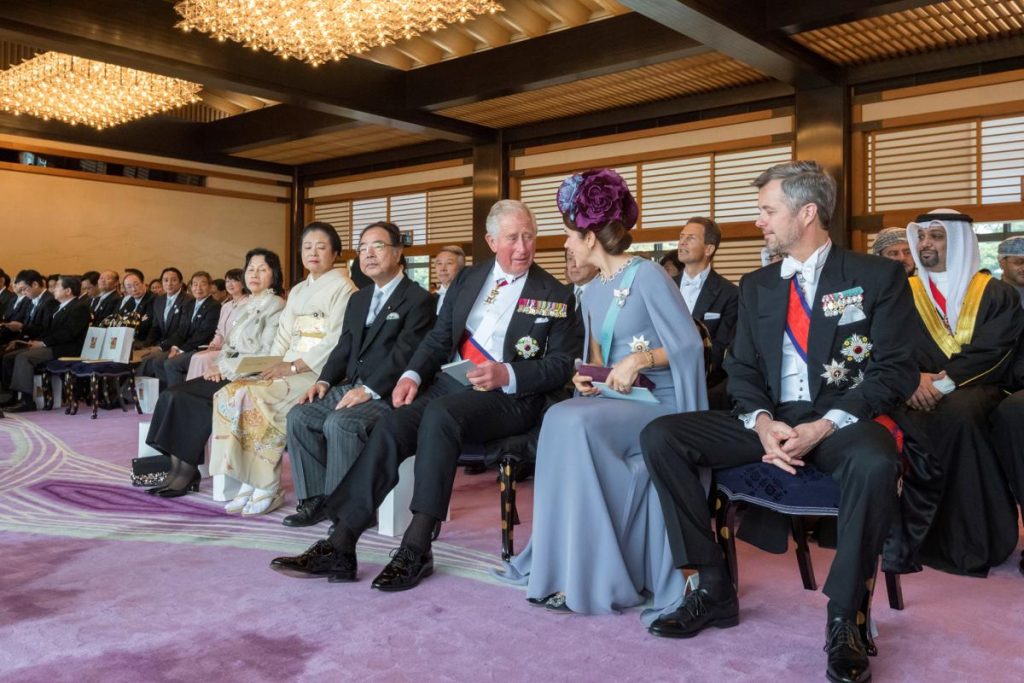Japanese Emperor Naruhito formally proclaimed his ascendancy to the throne on Tuesday in a centuries-old ceremony attended by dignitaries from more than 180 countries, pledging to fulfil his duty as a symbol of the state.
Naruhito became emperor and his wife Masako became empress on May 1 in a brief ceremony, but Tuesday’s “Sokui no Rei” was a more elaborate ritual at the royal palace in which he officially announced his change in status to the world.
“I swear that I will act according to the constitution and fulfil my responsibility as the symbol of the state and of the unity of the people,” the 59-year-old emperor declared, his voice slightly hoarse, in front of about 2,000 guests including Britain’s Prince Charles and Indian President Ram Nath Kovind.
“I sincerely hope that Japan will develop further and contribute to the friendship and peace of the international community, and to the welfare and prosperity of human beings through the people’s wisdom and ceaseless efforts.”
Naruhito is the first Japanese emperor born after World War Two. He acceded to the throne when his father, Akihito, became the first Japanese monarch to abdicate in two centuries, worried that advancing age might make it hard to perform official duties.
The long-planned celebrations, for which Japan declared a national holiday, were tempered following Typhoon Hagibis, which killed at least 82 people when it tore through Japan 10 days ago, and pouring rain early on Tuesday.
A public parade was postponed until next month to allow the government to devote attention to the typhoon clean-up, while Tuesday’s weather forced the palace to scale back the number of courtiers in ancient robes taking part in the courtyard ceremony.
But just before the ceremony began, the skies cleared and a rainbow appeared over Tokyo.
“Storm-like rain and winds came to a stop right before the ceremony, and the sun came out. I, along with people around me, were moved,” tweeted lawmaker Kentaro Sonoura, who attended the ceremony.
At the sound of a gong in the Matsu-no-Ma, or Hall of Pine, the most prestigious room in the palace, two courtiers bowed deeply and drew back purple curtains on the “Takamikura” – a 6.5-metre (21 feet) high pavilion that weighs about 8 tonnes.

Naruhito was revealed standing in front of a simple throne, dressed in burnt-orange robes and a black headdress, with an ancient sword and a boxed jewel, two of the so-called Three Sacred Treasures, placed beside him.
Fifty-five-year-old Harvard-educated Empress Masako, wearing heavy 12-layered robes and with hair flowing down her back, stood in front of a smaller throne to the side. Such traditional robes can weigh around 15 kilogrammes (33 pounds).
Prime Minister Shinzo Abe delivered a congratulatory speech before assembled dignitaries including Crown Prince Akishino, the emperor’s younger brother, and his family, all adorned in brightly coloured robes. Other guests included U.S. Transport Secretary Elaine Chao and Myanmar civilian leader Aung San Suu Kyi.
Abe led a trio of cheers of “banzai”, or “long life”, for the emperor, before a 21-gun salute. Guests from overseas were not required to join in shouting the phrase, which for some raises memories of the wartime emperor worship.
Naruhito had entered the palace to cheers from admirers before reporting his enthronement to his imperial ancestors at three shrines on the palace grounds, dressed in pure white robes.
“As he is young and energetic with outstanding leadership, I hope he’ll support the people of Japan, which has faced continuous disasters and typhoons,” said Tomoko Shirakawa, 51, who was among the crowds of umbrella-clutching citizens packing the area in front of the palace.
A court banquet was held on Tuesday evening, before Naruhito and Masako host a tea party for foreign royalty on Wednesday afternoon. The government pardoned about half a million people convicted of petty crimes, such as traffic violations, to mark the day.
Although the public parade was postponed until Nov. 10, NHK public TV said there were 26,000 police providing security.
Naruhito is unusual among recent Japanese emperors since his only child, 17-year-old Aiko, is female and cannot inherit the throne under current law. Unless the law is revised, the future of the imperial family for coming generations rests instead on the shoulders of his nephew, 13-year-old Hisahito, who is second in line for the throne after his father, Crown Prince Akishino.
Naruhito’s grandfather, Hirohito, in whose name Japanese troops fought World War Two, was treated as a god but renounced his divine status after Japan’s defeat in 1945. Emperors now have no political authority.
Though many Japanese welcomed the enthronement ceremony, there was a demonstration in downtown Tokyo in protest against the imperial system, and three demonstrators were arrested after jostling with riot police, Kyodo news agency reported. Tokyo police declined to comment.
“There is no need for such an elaborate ceremony. Traffic has been restricted and it is causing inconvenience for ordinary people,” said Yoshikazu Arai, 74, a retired surgeon.
“The emperor is necessary now as a symbol of the people, but at some point, the emperor will no longer be necessary. Things will be just fine without an emperor.”
